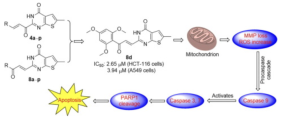In a preclinical research, Wang et al. — from the Children’s Hospital Affiliated to Zhengzhou University, Henan Children’s Hospital; Department of Neurosurgery, Beijing Tiantan Hospital, Capital Medical University; The Affiliated Hospital of Qingdao University; The First Affiliated Hospital of Jinzhou Medical University; and the Department of Drug Clinical Trials, Zibo Central Hospital — published in the European Journal of Medicinal Chemistry a targeted cancer therapy that leverages tumor hypoxia to maximize antitumor effects while reducing systemic side effects.
They concluded that CHD‑1 functions as a selective prodrug that becomes activated under hypoxia typical of solid tumors. It effectively inhibits tumor cell growth, triggers mitophagy, and induces apoptosis in these hypoxic cancer cells. In vivo, CHD‑1 significantly suppressed HeLa xenograft growth in mice. It also demonstrated a safer toxicity profile compared to the parent compound, based on acute toxicity assessments.
